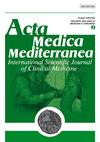结直肠癌癌相关成纤维细胞亚组预后标志物的评估
IF 0.3
4区 医学
Q4 Medicine
引用次数: 0
摘要
目的:肿瘤微环境(tumor microenvironment, TME)中的基质细胞是肿瘤发生的主要参与者之一。存在于肿瘤基质中的癌相关成纤维细胞(CAFs)通过多种机制参与肿瘤的进展,支持肿瘤生长、细胞运动和侵袭性。预测结直肠癌(CRC)复发风险的标记物的发现导致了几个基因面板的产生,包括colopprint。本研究旨在了解富含和缺乏钙的TME对colopprint预后指标的影响。材料与方法:利用公开的CRC肿瘤转录组数据,基于CAF特异性基因表达生成肿瘤亚组。随后,在这些亚组中评估colopprint基因的预后关系。结果和结论:我们的数据显示,与非分层分析相比,CAF分层亚组中colopprint基因的预后表现存在显著差异。我们发现多个基因失去了它们的预后意义,一些基因显示出相反方向的关联。17个基因中有9个在至少一个CAF特异性亚组中存在差异表达,大多数基因预测的预后与CAF水平无关。这些发现表明,在钙缺乏组和钙丰富组中,预后指标的表现有显著差异。因此,在这些生物亚群中测试潜在的生物标志物可能有助于开发更具体的基因面板。本文章由计算机程序翻译,如有差异,请以英文原文为准。
Evaluation of Prognostic Markers in Cancer-associated Fibroblast Based Sub-groups of Colorectal Cancer
Objective: Stromal cells in the tumor microenvironment (TME) are among the main players of carcinogenesis. Cancer-associated fibroblasts (CAFs) residing in tumor stroma are involved in cancer progression through various mechanisms, supporting tumor growth, cellular motility and invasiveness. The discovery of markers predicting recurrence risk in colorectal cancer (CRC) have led to the generation of several gene panels, including Coloprint. This study aimed to understand the impact of a CAF-rich and a CAF-poor TME on the performance of the prognostic markers in Coloprint.
Materials and Methods: Publicly available transcriptomic data of CRC tumors were used to generate tumor sub-groups based on CAF specific gene expression. Subsequently, prognostic relationships of Coloprint genes were assessed within these subgroups.
Results and Conclusion: Our data revealed that prognostic performance of Coloprint genes differed dramatically between CAF stratified subgroups compared to non-stratified analysis. We have found that multiple genes lost their prognostic significance and several genes showed an association in the opposite direction. 9 out of 17 genes were differentially expressed in at least one of the CAF-specific subgroups and majority of the genes predicted prognosis independent of CAF levels. These findings showed that the performance of the prognostic markers can vary significantly among CAF-poor and CAF-rich groups. Therefore testing potential biomarkers within such biological sub-groups may contribute to the development of more specific gene panels.
求助全文
通过发布文献求助,成功后即可免费获取论文全文。
去求助
来源期刊

Acta Medica Mediterranea
医学-医学:内科
自引率
0.00%
发文量
0
审稿时长
6-12 weeks
期刊介绍:
Acta Medica Mediterranea is an indipendent, international, English-language, peer-reviewed journal, online and open-access, designed for internists and phisicians.
The journal publishes a variety of manuscript types, including review articles, original research, case reports and letters to the editor.
 求助内容:
求助内容: 应助结果提醒方式:
应助结果提醒方式:


